It is an accusation that has been leveled at the Oscars all too often over the years, and 2020 is no different – too many men, not enough women, particularly in the most prestigious categories.
The hashtag #OscarsSoMale reared up again following the Academy Award nominations announced last month, with much of the focus on the absence of Greta Gerwig in the best director category.
Her acclaimed film adaptation of "Little Women" was shortlisted for best picture, but Gerwig's name was missing from an all-male, five-strong best director section, sparking controversy.
"It's quite remarkable, after everything that has happened over the last few years, that the Academy refuses to acknowledge women in multiple categories," said Tema Staig, executive director of the advocacy group Women in Media.
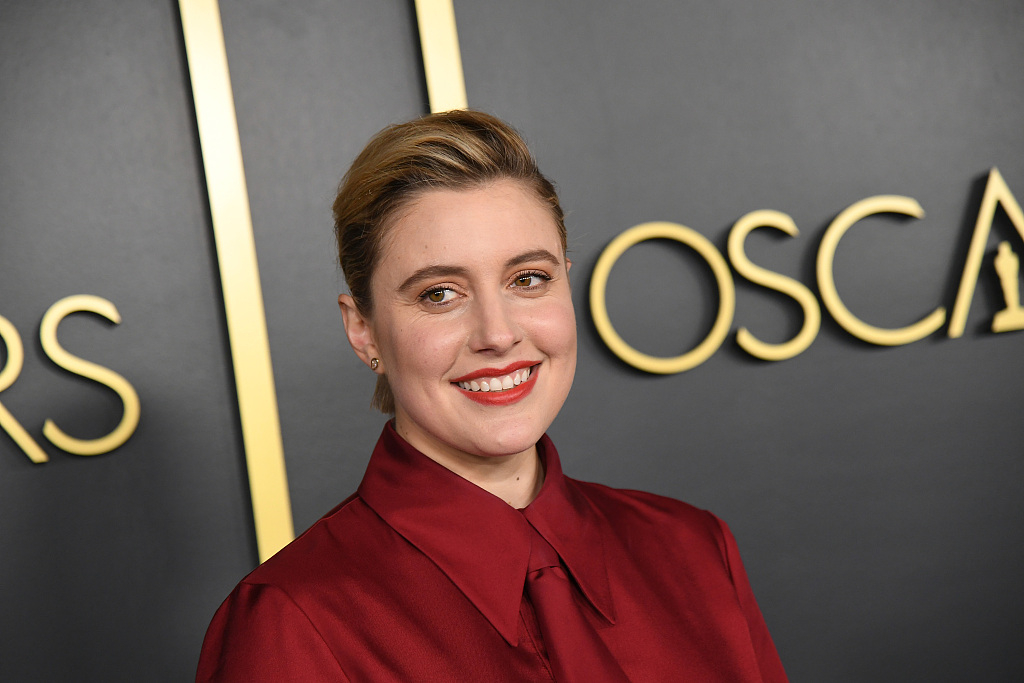
Greta Gerwig attends the 92nd Oscars Nominees Luncheon, Hollywood, California, January 27, 2020. /VCG Photo
Greta Gerwig attends the 92nd Oscars Nominees Luncheon, Hollywood, California, January 27, 2020. /VCG Photo
Some social media users and industry professionals have even called for a boycott of Oscars night on Sunday over the issue.
While that may be a minority position, there is little arguing with criticism of the Oscars' longer-term track record: it wasn't until 2010 that a woman won best director – Kathryn Bigelow for "The Hurt Locker."
No female directors have won since, and only five have ever been nominated over the course of more than 90 Oscars ceremonies.
But ironically, the last woman nominated in the category was Gerwig herself, for 2017's "Lady Bird."
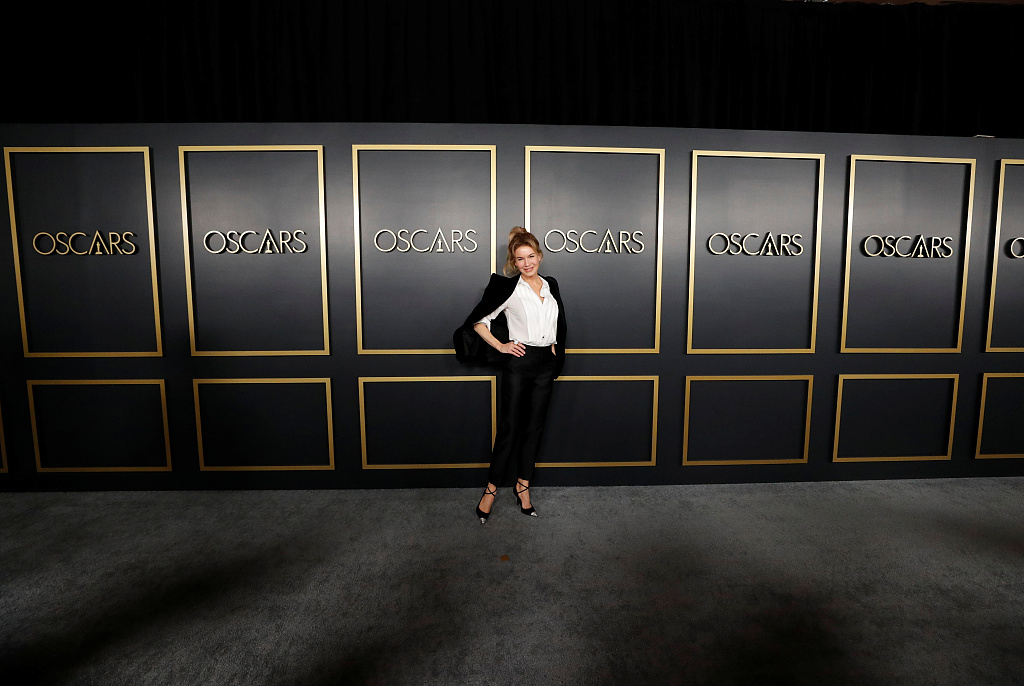
Renee Zellweger attends the 92nd Academy Awards Nominees Luncheon, Los Angeles, California, U.S., January 27, 2020. /VCG Photo
Renee Zellweger attends the 92nd Academy Awards Nominees Luncheon, Los Angeles, California, U.S., January 27, 2020. /VCG Photo
This nomination has been held up as proof by some that her absence this year is no deliberate exclusion, but simply a result of extremely strong competition in an award season featuring the likes of "Joker," "1917," "Once Upon a Time... in Hollywood," "The Irishman" and "Parasite."
Sasha Stone, founder of the Awards Daily website that has tracked film prizes for 20 years, described the supposed snub as "fake news."
"The misconception that Gerwig was passed over in favor of lesser male counterparts is patently untrue," Stone wrote.
Since the Oscars were first held in 1929, the Academy has faced an uphill battle to break with misogynistic habits – both within the organization, and the broader movie business.

Leonardo DiCaprio (C) and George DiCaprio attend the 92nd Oscars Nominees Luncheon, Hollywood, California, January 27, 2020. /VCG Photo
Leonardo DiCaprio (C) and George DiCaprio attend the 92nd Oscars Nominees Luncheon, Hollywood, California, January 27, 2020. /VCG Photo
"Of course, systemic gender bias in the film industry exists, without a doubt," said Stone.
While few women "in the past were ever trusted to helm prestige films," the directors' branch of the Academy of Motion Picture Arts and Sciences has itself "always been a boys' club," she said.
"For decades, its members were the men nominated for Oscars and the men who won them."
Melissa Silverstein, founder of the "Women and Hollywood" website and director of the Athena Film Festival, added: "It's disturbing but not surprising that women directors still don't get the respect and awards that male directors do."
"The system and the culture are the problems," Silverstein said.
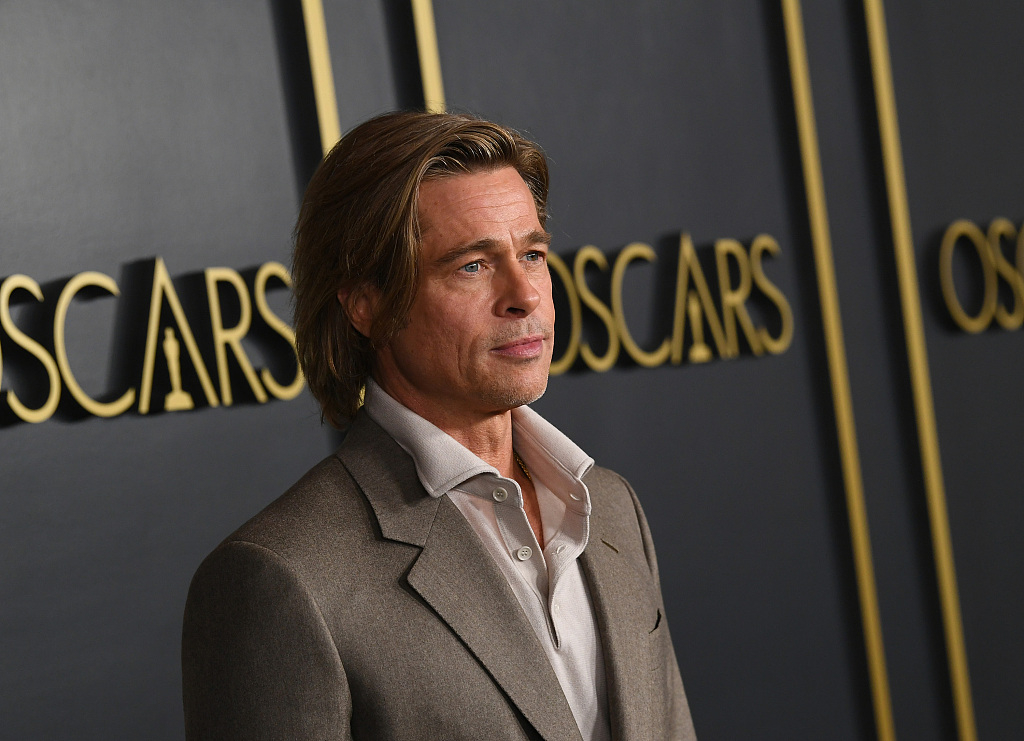
Brad Pitt attends the 92nd Oscars Nominees Luncheon, Hollywood, California, January 27, 2020. /VCG Photo
Brad Pitt attends the 92nd Oscars Nominees Luncheon, Hollywood, California, January 27, 2020. /VCG Photo
The Academy has boosted efforts to address this, increasing its membership dramatically after criticism of under-representation of women and minorities.
Since 2016, it has expanded the number of Oscar voters – currently around 8,500 – by 35 percent.
"We went through our membership roster and said, 'Who have we not included? Who needs to be here?'" Lorenza Munoz, the Academy's head of member relations and awards, told The Hollywood Reporter.
"And there was a very long list of people. Our members have really dug in and taken it very seriously."
The organization is still 68-percent male and 84-percent white, but for the first time in history, women made up half of the new recruits added last year.
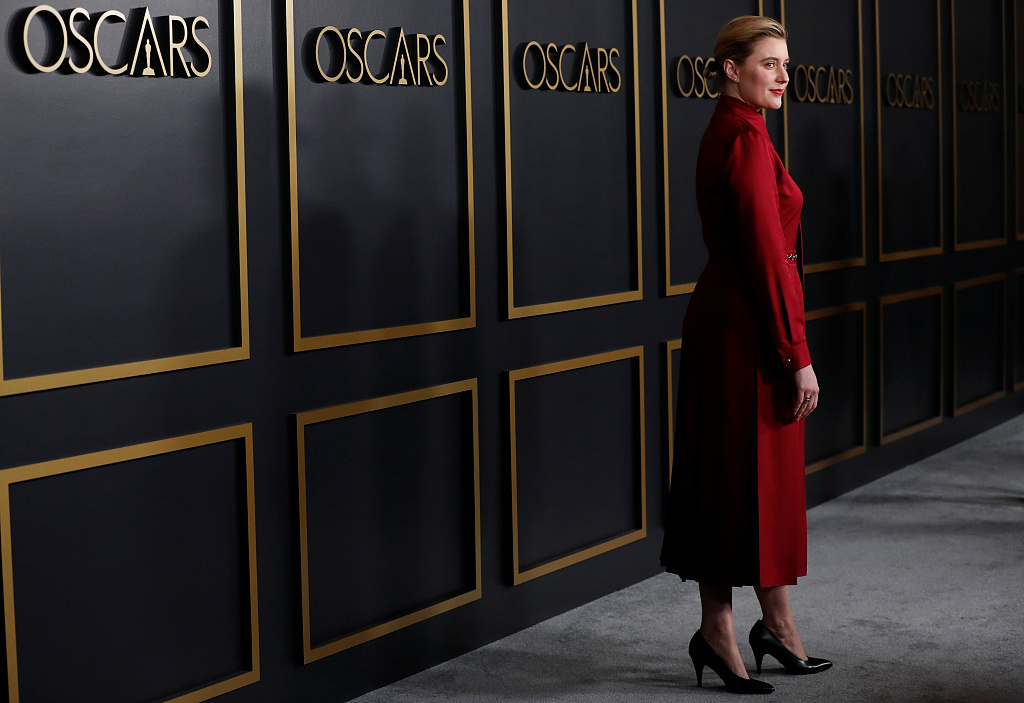
Greta Gerwig attends the 92nd Academy Awards Nominees Luncheon, Los Angeles, California, U.S., January 27, 2020. /VCG Photo
Greta Gerwig attends the 92nd Academy Awards Nominees Luncheon, Los Angeles, California, U.S., January 27, 2020. /VCG Photo
And at last month's Oscar nominations announcement, an Academy press release prominently noted that a "record 64 women were nominated, one-third of this year's nominees."
This statistic includes Gerwig's own two nominations – best adapted screenplay for "Little Women," and best picture, as she is one of the film's producers.
And more broadly, several of the most eagerly awaited films of 2020 will be directed and/or produced by women, such as "Wonder Woman 1984", "Mulan" and "Black Widow."
"There have been great strides and we've got to keep going: keep writing, keep making, keep doing. It's all there," Gerwig said.
Since the first Oscar ceremony in 1929, just 15 percent of the golden statuettes for acting and film production have been handed to women, according to an AFP analysis of data on winners of individual awards (not overall awards given to films).
This is equivalent to 376 women from a total 2,435 winners.
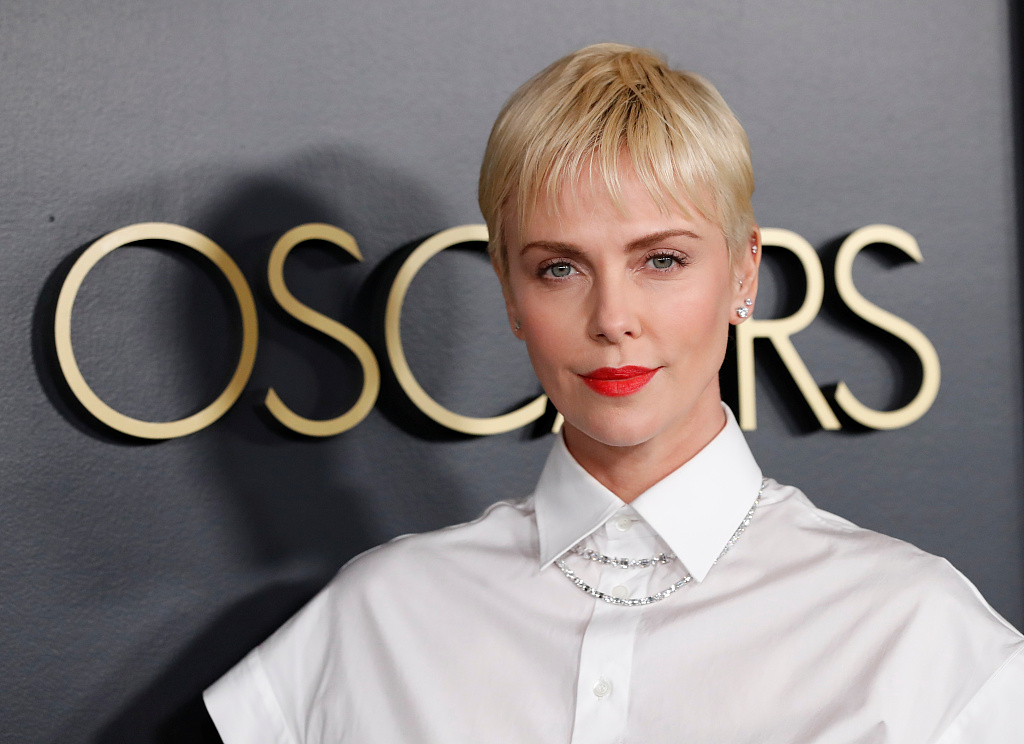
Charlize Theron attends the 92nd Academy Awards Nominees Luncheon, Los Angeles, California, U.S., January 27, 2020. /VCG Photo
Charlize Theron attends the 92nd Academy Awards Nominees Luncheon, Los Angeles, California, U.S., January 27, 2020. /VCG Photo
The proportion of women drops to roughly 10 percent, or 201 of 2,085, when the gender-specific actor and actress awards are not included.
The percentage of women winners has increased over time, but they remain largely in the minority.
For the first 10 years of the Oscars, 13 percent of winners were women – and only four percent in the categories open both to men and women.
Over the most recent decade, this rose to 22 percent of overall laureates, and 17 percent in the mixed categories.
The most "feminine" Oscars were in 2016: the jury handed 11 of 30 mixed awards, or about 37 percent, to women.
The prestigious best director category has only gone to a woman once: to American Kathryn Bigelow in 2010 for "The Hurt Locker". No woman has been nominated this year.
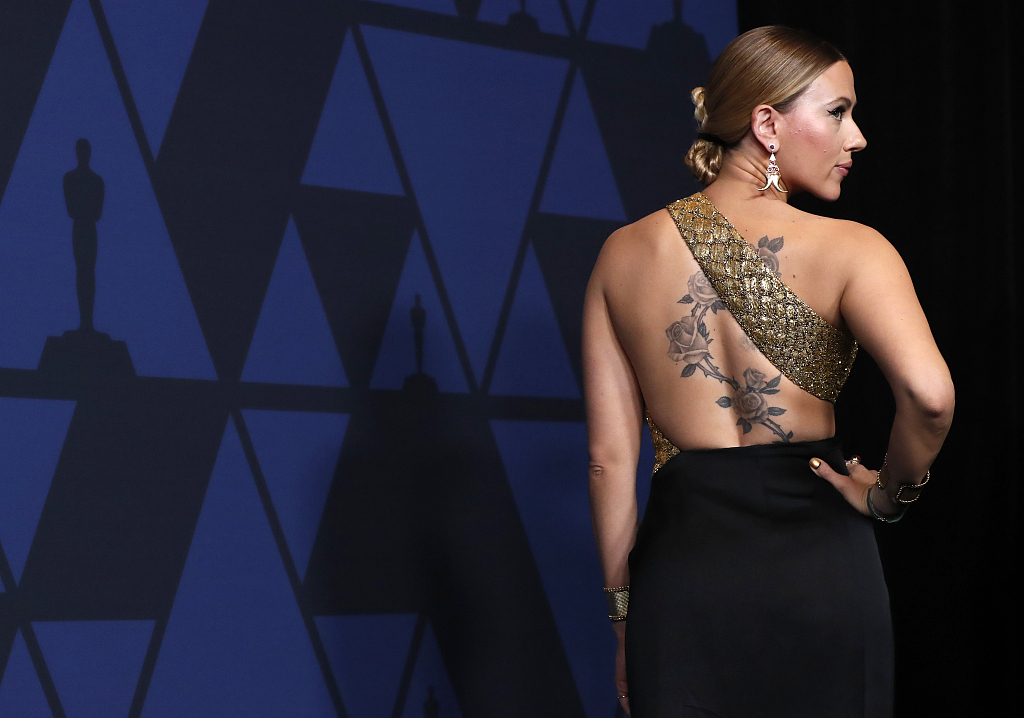
Scarlett Johansson arrives at the 2019 Governors Awards, Los Angeles, California, U.S., October 27, 2019. /VCG Photo
Scarlett Johansson arrives at the 2019 Governors Awards, Los Angeles, California, U.S., October 27, 2019. /VCG Photo
There has also only been one woman among the 207 winners for sound mixing: American Lora Hirschberg in 2011 for "Inception".
The best visual effects award has only been handed to women twice, from a total 240 winners.
The best original score category has only seen three female winners out of 167: American lyricist Marilyn Bergman in 1984 for "Yentl"; English composer Rachel Portman in 1997 for "Emma"; and Englishwoman Anne Dudley in 1998 for "The Full Monty".
They may be joined this year by Icelandic maestro Hildur Gudnadottir, who is nominated for her work on "Joker".
While still under-represented, women fare better in the categories of screenplay with 21 winners out of 279; sound editing (six of 72); production design (25 of 296); and film editing (15 of 113).

Saoirse Ronan arrives at the 2019 Governors Awards, Los Angeles, California, U.S., October 27, 2019. /VCG Photo
Saoirse Ronan arrives at the 2019 Governors Awards, Los Angeles, California, U.S., October 27, 2019. /VCG Photo
For acting, the spread of winners is equal between the genders because of the separate categories for men and women in leading and supporting roles.
But young actresses take home by far more awards than their older colleagues.
Of 92 winners for best actress, only 11 have been aged over 50. This compares to 21 for best actor.
And 32 of the women were aged under 30, which is the case for only a single male actor: Adrien Brody for "The Pianist" in 2003.
It means that winning male actors are, on average, seven years older than their women counterparts, a gap that has nonetheless closed to four years over the past decade.
(With input from AFP)
(Cover image by Gao Hongmei)